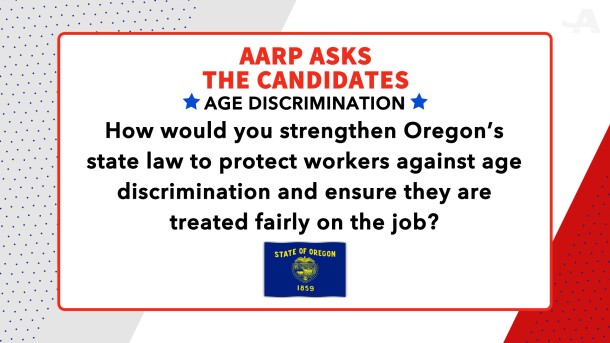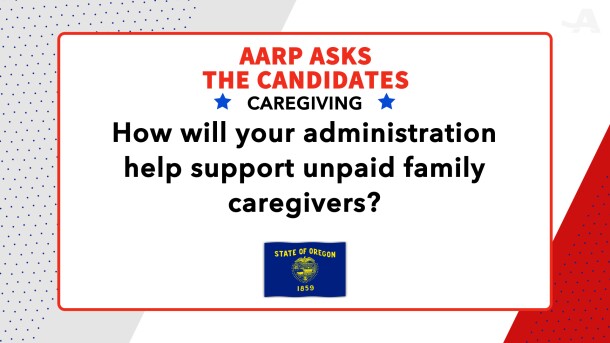AARP Hearing Center

Oregon's Nov. 8 general election will feature several tight and closely watched races, including the contest to replace Gov. Kate Brown, who is term-limited and cannot run for re-election. Among the candidates vying for governor are former state Rep. Christine Drazan (R), who was the minority leader in Oregon's House of Representatives; former Rep. Tina Kotek (D), who was the speaker in Oregon's House of Representatives; and Betsy Johnson (unaffiliated), who previously served in both the state house and senate as a Democrat.
AARP Oregon spoke with the three gubernatorial hopefuls to see where they stand on key issues for 50-plus voters. Here's what they had to say:
1. Older Americans are healthier and working longer than previous generations. Workers 50 and older already make up over one-third of the labor force, and workers 65 and older are the fastest growing age group in the workforce. Yet more than 6 in 10 older workers report they have seen or experienced age discrimination in the workplace. How would you strengthen Oregon's state law to protect workers against age discrimination and ensure they are treated fairly on the job?

Drazan: You know, older Oregonians are a critical part of our state, our community and, certainly, our workforce. The thing that I will absolutely stand up for as Governor of the State of Oregon is for all Oregonians to have a voice in their own lives, which includes ensuring that they are protected against discrimination. The fact that we have such a thing as age discrimination in the workforce needs to be addressed in our state. And the opportunity to work with AARP and other groups, as we do everything that we can to support older working Oregonians — I will be there for you.
Kotek: First of all, I've always stood up for workers to make sure that they're working in fair and respectful workplaces. And that's not going to change. When it comes to our older population, our older Oregonians who are working — either by choice or because of financial need — employers should be supporting them. They are an incredible asset for our current workplaces. When it comes to age discrimination — totally unacceptable. That's why I fought for more resources to the Bureau of Labor and Industries, so they could do more to respond to age discrimination and complaints — like having two more staff people in their civil rights division, making sure we had more opportunity to educate and provide outreach to employers so they know what age discrimination actually is, and then also doing the research to track the issue. But here's the thing: AARP knows from their surveys that age discrimination is real and it's a problem in Oregon. And as your next governor, I'm not going to tolerate that. I'm going to do everything I can to make sure we are taking on age discrimination in our state.
Johnson: Let me start by saying, I am one of those working seniors, and I think that would make a huge difference to your members to go into the governor's office and know that you were speaking to one of your own. I would anticipate using the convening authority of the governor and the governor's ability to manage state agencies to help drive an urgency in talking about senior issues. My husband has chaired the governor's commission on senior services. I was a care provider for my 93-year-old mother, who stayed in the workforce until the last two months of her life. Expect vigorous protection of all aspects of senior participation in the workplace with respect to defining age discrimination and what we need to do to prove that case. If elected, I will continue to consult with AARP and senior advocates to develop policies and legislation to wipe out discrimination in the workforce based on age.
2. Americans pay the highest cost for prescription drugs in the world, and fighting against the high prescription drug prices is a priority for AARP. During the 2021 legislative session, Oregon created a Prescription Drug Affordability Board (PDAB), however, the board does not yet have the authority to take any regulatory action. How would you strengthen the ability of the PDAB, and what other steps would you take to reduce prescription drug prices in Oregon?

Drazan: As a state representative, when I first started in the state legislature, I asked to serve on the health care committee, and I did that because when I was running for office, it seemed like every single door I knocked on, somebody wanted to talk to me about health care. They wanted to tell me that they were struggling to pay for their prescription drugs or their local pharmacy had closed down, and they were struggling to be able to care for their loved ones and get away to pick up medications. All of these challenges that people face in everyday life across our state are because of how critical and important our health care costs are. Prescription drugs themselves — I am proud to have worked on legislation to ensure that drug companies give notice prior to increasing drug costs. I'm proud to have worked on legislation to hold down the cost of insulin and will continue to stand up and fight for Oregonians, which are facing these tough choices between paying for needed medical necessities and everyday cost of living. There's more we can do, but we can do this work together.
Kotek: Oregonians need to be able to afford their prescription drugs. When I worked at Oregon Food Bank, I would see it firsthand when people would talk about the ongoing high cost of prescription drugs and why they couldn't afford to meet their basic needs because of it. What people should understand about me is that I'm an advocate and a fighter for Oregon. And what I'm gonna make sure is that we can lower the price of prescription drugs. That's what I did as speaker of the house. We capped the cost of insulin for Oregonians who have diabetes, and I helped set up the Prescription Drug Affordability Board. Now, that's a really good start, but there is more work to do there. And as governor, I'm gonna direct the Oregon Health Authority to take those recommendations from the Prescription Drug Affordability Board and do more to make it easier for Oregonians to afford the prescription drugs that they need.
Johnson: I supported the bill that caused the board to be appointed. I understand that it took along time to name the positions, that one vacancy may yet exist. As governor, I would impart a sense of urgency to the work of that board. I would make sure that all of the positions were filled, that they were adequately staffed and financed to do the important work that they need to. I would publish early on a robust meeting schedule with adequate public portals so that the public could participate free from any interference of the business of the board. I would look at some of the other hidden costs, like prescription benefit managers. And last but not least, I would think about rural pharmacies, some of which have closed, because access is as important — in some cases, more important — than affordability. And so those would be some of the things that I would be interested in doing as governor.
3. As our population ages, we need to provide support for home and community-based, quality long-term care services, which includes unpaid family caregivers. In Oregon, as of 2017, there were approximately 460,000 family caregivers providing an estimated 390 million hours of care (translating to $5.9 billion in economic value). They help older parents, spouses, partners and other loved ones live independently, at home, by providing assistance with activities like bathing and dressing, as well as performing complex medical/nursing tasks. How will your administration help support unpaid family caregivers?

Drazan: I know how important it is for our older Oregonians to be able to stay in their home. We know for that to happen, that in many, many cases, we are dependent on family caregivers. We're dependent on spouses and kids that are willing to do whatever they have to do to make sure mom or dad can stay in their home as long as possible. That network — that base of support — is essential. It is a strong base of advocacy, supports, and, frankly, we have got to do everything that we can to ensure that it continues. We have got to continue to expand access to home care workers. All of those folks need access to respite. They need access to supports, and we need to do everything we can as a state to recognize and value the role that they play in supporting older Oregonians and ensuring that they stay in their homes.
Kotek: We all want to be able to age with dignity in the home of our choice. And right now that's happening for a lot of Oregonians because of unpaid family caregivers. And I want to say thank you to the folks who are doing it now. And I want you to know as your next governor, I'm going to have your back. I'm going to make sure I can help you do the work that you're doing, because — you know, it's a labor of love, but it is emotionally and physically taxing, as you know. So I want to support you as your governor. That includes making sure we have more resources for things like respite services, those adult day services that are really helpful for you to be able to take a break and take care of yourself. It's also one of the reasons I fought very hard as speaker of the Oregon House to pass our paid family medical leave insurance program. It's really important that if you have to take time off work to take care of a loved one, that you have someway to support yourself, with an income. And as governor, I'm going to make sure that we get that program off the ground and support our families.
Johnson: During my entire legislative service, I've been a champion of Oregon Project Independence .I also have been one of those caregivers for my 93-year-old mother. So I think I have a unique understanding of the emotional, medical, social and complex nursing needs that aging seniors have in their homes. I want to hear from actual caregivers and beneficiaries of that loving care to be able to form a complete opinion of where there are gaps in the system. This whole dynamic should not be driven entirely by SEIU but should be a wide table of lots of complex opinions that will help give rise to a comprehensive solution. I would advocate for cost-free, advanced training for system integration links to professional provider networks and not-for-profits, explore possible tax breaks. These are an important component of keeping seniors in their homes.
4. By 2034, there will be more people over 65 than under 18, and here in Oregon, we are at the forefront of this demographic shift. AARP has successfully advocated for cities and states to be designated as age-friendly and commit to creating a comprehensive plan for aging. How will your administration develop policies to help people thrive and age well in our state?

Drazan: I look forward to the opportunity to work with older Oregonians, to determine what meets their needs — today and tomorrow. We know that the older Americans in our lives — the older Oregonians in our families — are the ones that engage in our local communities. They're the ones that volunteer for the Rotary. They're the ones that show up and backfill the babysitter. They are critical and essential parts of every aspect of our lives. And it would be a privilege to do everything that I can, as that population becomes a majority or a greater percentage of Oregonians — it would be a privilege to work with you to ensure that your needs are met in planning and all of the future work we do on your behalf in Oregon.
Kotek: So here's the fact: We are all aging, and it's going to be important to be strategic and smart about how we plan for the future for all Oregonians. And as governor, I look forward to working with AARP and other partners to work on a comprehensive plan in all areas of our lives to make sure we can have an age-friendly state. It's one of the things that I worked on when I was speaker of the house, around housing. I worked really hard with AARP to pass a bill that said, let's have different housing options in our existing neighborhoods. So when you're downsizing from that big house with the big yard that you have, you can stay in your neighborhood and maybe live in a duplex right down the street. Having more options for housing within our urban growth boundaries is one way we can create an age-friendly state, and I've already started that work in housing. But we have to have a comprehensive plan, from housing to transportation to other issues, so people can age in a way that they can be successful and we can all be successful.
Johnson: I want to applaud AARP for setting the policy framework that anticipates this huge demographic shift. One of the things that we need is a statewide strategic plan, and I would work aggressively to make sure that objective criteria were laid out. I think one of your policy manuals does that. But to encourage planners, city managers, work with the League of Oregon Cities and the Association of Oregon Counties to make sure that they were full partners. We need health care systems that are accessible and affordable, especially for fixed-income seniors. We need housing policy to keep seniors where they choose to be. I recently helped to break ground on a multigenerational facility in the city of St. Helens. We need tax policy that understands how one can have a secure retirement and also pass on assets. We need real solutions versus a marketing effort. And it goes right down to the street level, where we have got to have safe streets for our seniors that are transiting through major metropolitan areas.
Also of Interest:
- Learn how to vote in Oregon's 2022 elections at aarp.org/orvotes
- Stay updated on the 2022 election at aarp.org/election
- Keep up with local events and AARP advocacy efforts at aarp.org/or































































